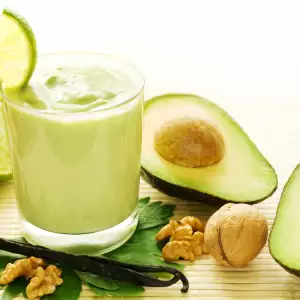Omega-9 fatty acids are important fatty acids which the body can't synthesize on its own and need to be brought into the body through food or food supplements. They comprise a group of 5 unsaturated fatty acids, with 2 of them being the most important for humans - erucic and oleic acids.
The one property these 5 fatty acids share in common is the double carbon bond at the omega-9 position in their molecular structure.
It's key to note that omega-9 fatty acids are essential only to a certain degree. They can be produced from omega-3 and omega-6 essential fatty acids.
Omega-9 fatty acids have 2 primary functions. First, they are part of cell membrane composition, where they replace saturated fatty acids, which are known for their many negative effects.
Second, omega-9 stimulate cell receptors of bad cholesterol, which leads to decreased levels of it in the blood.
Choosing and Storing Omega-9 Fatty Acids

Omega-9 fatty acids are contained in the formulas of various essential fatty acid complexes. As part of the 3-6-9 formula, omega-9s are put into complexes along with herbal extracts, vitamins, amino acids, minerals.
In these formulas, the different components are divided into groups. Each group of a single dose needs to be drunk according to a specific framework to avoid certain consequences.
Benefits of Omega-9 Fatty Acids
Most folks have heard about the health benefits of the Mediterranean diet. This is because the foods rich in olive oil protect the heart and one of the main components of olive oil is oleic acid.
Omega-9 fatty acids lower bad cholesterol levels in the body, thus preventing the development of cardiovascular diseases. They decrease the risk of atherosclerosis and slow further development of such already existing.
Omega-9s lower insulin resistance, raising the productivity of glucose use. They improve immune functions and have a well-defined action in the battle with certain cancers.
Last but not least, omega-9 fatty acids help myelin synthesis. Myelin is a substance that covers the sections of nerve cells that transmit information.

Doses of Omega-9 Fatty Acids
Oleic acid is primarily added to food supplements with omega-9 due to the protective effect it has on the heart. It makes up between 50 and 80% of olive oil's mass, which is why there hasn't been any widely established limit for safe intake.
The recommended daily dose of omega-9 for people who do not use olive oil is a minimum of 3 g.
Taking omega-9 fatty acids alongside antioxidants lowers the effectiveness of both. An interval of several hours is needed between taking supplements. Omega-9 fatty acids must be taken with food.
Sources of Omega-9 Fatty Acids
It's evident that oleic acid has a greater impact on health. Olive oil is an excellent source of this acid. Oils from rapeseed and grape seeds are also very rich in omega-9.
Other ways to procure thee valuable acids include eating sesame oil, avocado, macadamia, almonds and peanuts. Aside from these products, omega-9 fatty acids are found in pork and chicken meat. Omega-9 can be procured through dietary supplements as well.
Dangers of Omega-9 Fatty Acids
Infants shouldn't take sources of one of the omega-9 fatty acids - erucic. This is because they do not yet posses the mechanism for its absorption. There have been no significant side effects observed in adults.
















